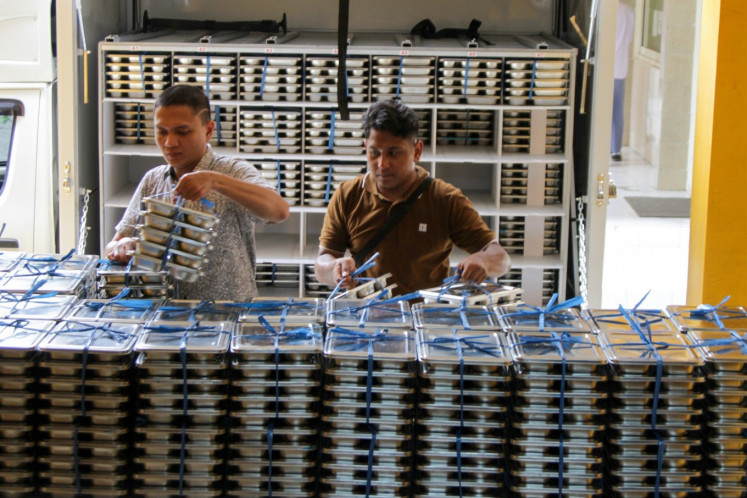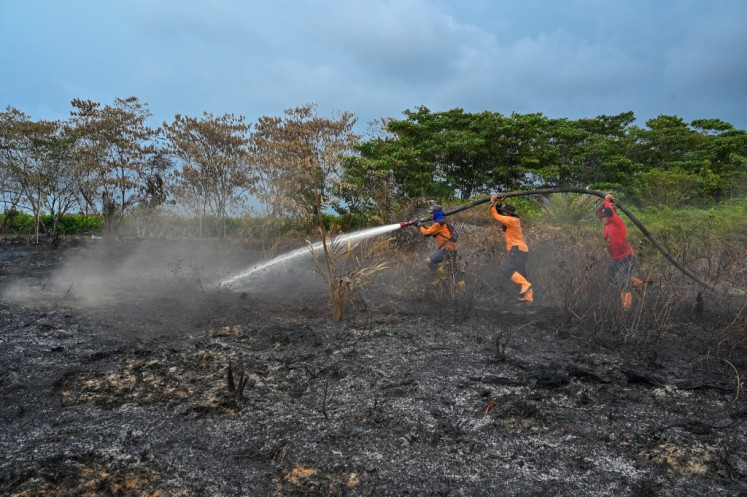Disability rights: Learning from Shinta Utami
In April 2017, Shinta Utami, a wheelchaired woman, traveled from Yogyakarta to Jakarta in a manual wheelchair, maneuvering it with her hands
Change text size
Gift Premium Articles
to Anyone

I
n April 2017, Shinta Utami, a wheelchaired woman, traveled from Yogyakarta to Jakarta in a manual wheelchair, maneuvering it with her hands. It was an arduous journey, yet she was unwavering in her determination.
As CNN Indonesia reported, the purpose of her journey was to inspire people, especially people with disabilities, and to show that they can accomplish anything they want to, despite their myriad liminations.
She admitted that, in addition to exhaustion from wheeling her chair in the heat, it was also challenging for her to keep explaining that her disability did not automatically mean she needed help.
On her personal blog and in news reports, Shinta joked that too much help could spoil people with disabilities. During her journey, Shinta ran into countless kind people who wanted to lend a helping hand, for which she was grateful.
She often refused them politely, simply because she did not need help in operating her wheelchair.
She asked for help only when she needed it. Her statement might have seemed a contradiction to a kind and open-hearted society, especially toward people with disabilities.
However, her statement was a lesson for those who still assumed that wheelchaired people or anyone with a disability were, without question, “handicapped” and therefore automatically entitled to outside help. Or to put it differently, that people with disabilities were pretty much dependent on the mercy of their community.
Shinta’s voice is significant in understanding what “being disabled” means for people with disabilities, because all too often, perceptions on and reactions to disabilities coming from people without disabilities and are based on their internalization and assumptions on what a disability is.
Shinta is one individual among more than 10 million Indonesians with disabilities, according to the 2015 data of the National Development Planning Agency (Bappenas).
Shinta’s endeavor shows that “being disabled” is not inherent in a person’s impairment — a loss or weakness in psychological or physiological function or ability.
Rather, “being disabled” is a social construct: it is a result of both biological and social conditions.
A person might be born blind or with another physical impairment, but whether they are disabled depends heavily on their family, friends, neighbors, schools, the city where they live and other elements of their social environment.
Renowned Russian psychologist LS Vygotsky argued that “being disabled” was a mere indication of a behavioral difference between people with disabilities and people without disabilities: “A blind person will remain blind and a deaf person deaf, but they will cease to be handicapped because a handicapped condition is only a social concept.”
In fact, we are all (re)constructing how we think about disabilities and people with disabilities.
Many public places such as airports, train stations and parking lots now have designated
areas for people with physical disabilities.
This is a small, yet concrete, proof that people with (physical) disabilities must be provided the same access without being discriminated for their disabilities.
We are fortunate to have leaders such as the transportation minister, Bandung Mayor Ridwan Kamil, former Jakarta governor and President Joko “Jokowi” Widodo, to name but a few, who appear consistent in their concern for spatial justice.
Through leaders like these, systems and people can shift meaningfully toward inclusion. The relatively new term of pendidikan inklusi (inclusive education) is proof of the paradigm shift in how Indonesia as a society perceives disabilities and how this is translated into educational policy and practice.
Another proof that the concept of “being disabled” is a social construct is seen in the use of terms such as disabilitas (disability), difabel (differently abled) and masyarakat berkebutuhan khusus (people with special needs). We have come far and left behind non-constructive labels such as cacat (handicapped), gila (crazy), idiot and the like.
The previously widespread use of these derogatory terms may also have arisen from a lack in our (collective) knowledge of what a disability is.
Where did the concept of “being disabled” emerge? Is it a western construct, and so what if it is? Is no one in Indonesia treated as a second-class citizen because of their physiological or psychological condition?
Are there no children in Indonesia who cannot access education or play with their friends simply because of a loss or lack in their physiological or psychological function?
Are there no people with disabilities struggling to navigate the systems and infrastructure (e.g., jobs, roads, buildings) that have been designed exclusively for people without disabilities? I think we know the answer.
We learn from countries in the West because they have undergone such struggles and deconstruction processes.
The continuing search for appropriate terms with more positive and constructive meanings is proof that the Indonesian society is (re)constructing its perception on “being disabled” and disabilities, and that a disability is only one of the many differences among human beings.
________________________
The writer is pursuing a doctorate in special education at the Department of Rehabilitation Psychology and Special Education, University of Wisconsin-Madison, United States.









